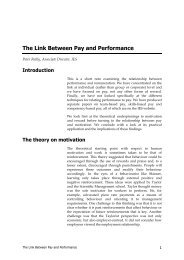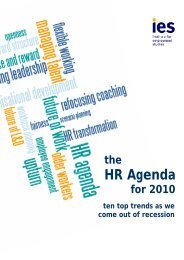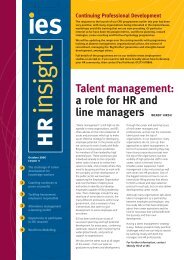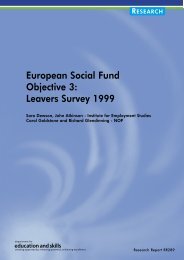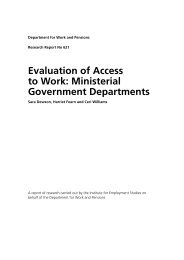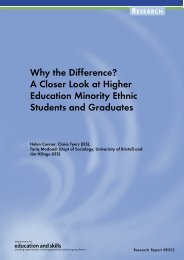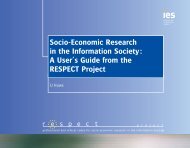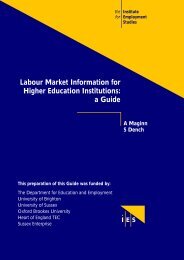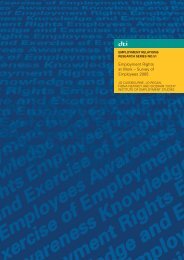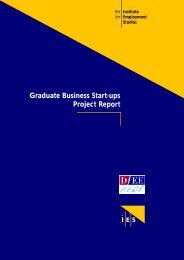Post-16 Transitions: a Longitudinal Study of Young People with ...
Post-16 Transitions: a Longitudinal Study of Young People with ...
Post-16 Transitions: a Longitudinal Study of Young People with ...
You also want an ePaper? Increase the reach of your titles
YUMPU automatically turns print PDFs into web optimized ePapers that Google loves.
met by his special school sixth form, or Sophie, where the<br />
experience has been less troubled but where her parents play a<br />
key part in seeing her through to adulthood.<br />
However, it is also true <strong>of</strong> other young people, who are less<br />
obviously dependent but are nonetheless not capable <strong>of</strong> making<br />
their own way <strong>with</strong>out a good deal <strong>of</strong> guidance. For instance,<br />
Gareth’s mother played a key role in researching the options<br />
available to him and helping him to find an alternative to his<br />
special school’s sixth form unit. In fact, she continued to be<br />
actively involved in the decision-making process long after this<br />
initial placement. At the time <strong>of</strong> the case study interview she was<br />
trying to steer him away from a Performing Arts course, despite<br />
opposition from both Gareth and his tutors, on the grounds that<br />
the course is <strong>of</strong> limited utility and that the real attraction for<br />
Gareth may simply be that his girlfriend is in the same faculty.<br />
Nonetheless, she accepts, the college will be careful that it is the<br />
young person’s choice which prevails.<br />
This example is typical both <strong>of</strong> the central role played by parents<br />
and carers and <strong>of</strong> the extent to which that role does not fit into<br />
stereotypes <strong>of</strong> ‘over-protection’. Gareth’s mother is certainly active<br />
on his behalf and has a clear view <strong>of</strong> where his best interests lie.<br />
However, her acceptance that Gareth will, in the end, decide for<br />
himself (and <strong>of</strong> the college’s right to protect his autonomy) speaks<br />
more <strong>of</strong> the tensions that can arise in any family than <strong>of</strong> overprotectiveness.<br />
Given that many <strong>of</strong> these young people have a<br />
history <strong>of</strong> genuine difficulties in planning their futures and making<br />
rational decisions and that the options available to them commonly<br />
do not lead in any obvious way to attractive outcomes such as<br />
employment or high-level qualifications, a degree <strong>of</strong> protectiveness<br />
on the part <strong>of</strong> their families seems entirely justified.<br />
This high level <strong>of</strong> involvement, <strong>of</strong> course, does mean that parents<br />
and carers can easily come into conflict <strong>with</strong> pr<strong>of</strong>essionals in the<br />
decision-making process. In such cases, the lack <strong>of</strong> certainty about<br />
the precise nature <strong>of</strong> these young people’s capacities and<br />
difficulties creates the potential for conflict as parents argue for<br />
options which pr<strong>of</strong>essionals regard as inappropriate.<br />
There is, in other words, a considerable resource here which could<br />
potentially be drawn upon for the benefit <strong>of</strong> young people, and the<br />
failure to manage that resource productively, however<br />
understandable, is a grave omission.<br />
Matthew, for example, is currently unemployed and has relatively<br />
little support other than from his own family. The commitment <strong>of</strong><br />
his mother in particular is considerable. Not only did she have to<br />
battle to get his difficulties recognised in school, but she had to<br />
face the dual pressures <strong>of</strong> being told by his school that he was<br />
badly behaved while Matthew himself was telling her that he was<br />
unhappy because he was being bullied. Since he became<br />
unemployed, she has played a major part in supporting his search<br />
for work. However, it is also clear that she has no real idea as to<br />
why Matthew cannot find work or what to do to improve his<br />
chances. Matthew has been rejected by employers for even the<br />
most low-paid jobs and neither he nor she understand why. Her<br />
<strong>Post</strong>-<strong>16</strong> <strong>Transitions</strong> <strong>of</strong> <strong>Young</strong> <strong>People</strong> <strong>with</strong> SEN: Wave 2 99



